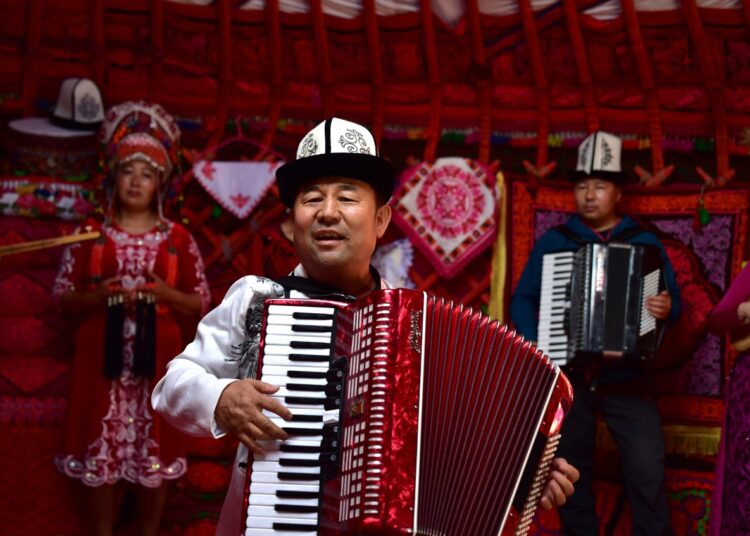By People’s Daily
A teapot was steaming on the stove, perfuming the room with the aroma of milk tea. Worizhan Abdulraheem rose slowly and walked toward the kitchen, and poured the milk tea into a white porcelain bowl. Her son was doing homework in another room of her house.
It was hard to imagine that her family of eight were still living in a 60-square meter shabby adobe in Qinghe county, Altay, northwest China’s Xinjiang Uygur autonomous region before July, 2016.
It was poverty alleviation relocation that shed a light of hope for Worizhan. Together with over 3,300 people from 850 households, she moved to Heping community.
Relocation was only the first step, and follow-up efforts were also ensured to help the people maintain stable income. The local government introduced enterprises and encouraged villagers to find a job near their home, as a result of which Worizhan became a child-care worker of a kindergarten. Her husband also found a job near their home. The family now earns around 66,000 yuan each year, including the income gained from land transferring.
Development is for the people and reliant on the people, and its fruits are shared by the people. From 2014 to 2019, Xinjiang’s affordable housing projects launched in both urban and rural areas had assisted over 675,600 impoverished households, putting an end to the time when poverty-stricken rural residents had to live in dilapidated houses.
Wulandandagai is a village located in Bortala Mongolian Autonomous Prefecture, Jinghe county of Xinjiang. Rows of houses are standing neatly there, surrounded by straight roads. Though the village is adjacent to desert, a vast protection forest shields it from sand storms. Various fitness equipment is offered on a square of the village for residents. However, this place was once filled with dilapidated houses and covered by mud.
Two years ago, an earthquake happened to Jinghe county, and Wulandandagai village, the epicenter of the disaster, suffered severe losses. “After the quake, village cadres and villagers worked in solidarity, and rebuilt houses for 210 households totaling 16,800 square meters in less than 80 days,” said Butdal, the first secretary of the village.
Jee Nadman is a villager that had his house rebuilt. Now, he lives in a big apartment with a flush toilet and water heater. “I must work harder after moving here,” he said, adding that he has planted over 3 hectares of cottons which earns him a net income of more than 50,000 yuan. Besides, he also keeps 30 sheep, which adds another 15,000 yuan of income.
After sending his child to the kindergarten, Yilias Abu, an employee of the third division of Xinjiang Production and Construction Corps, started making socks at home together with two of her neighbors. The equipment was provided by a local sock manufacturer for free. The enterprise sends semi-finished products to them, so they can make money even without going out.
Yilias’s home is in a relocation site where 49 houses are built neatly aside a road. Every house has a yard and a small piece of vegetable garden at the gate. Now, Yilias has transformed her living room into a workshop, saying it’s comfortable living there. “The most important thing is that we have the opportunity to make money, and a machine can offer jobs for three people,” she said.
In a fig plantation base of the 14th division of Xinjiang Production and Construction Corps, fig fruits are hanging on the trees, waiting to be picked and shipped to markets. Hariguli Memet, who was once impoverished, was busy working with her colleagues. She’s from the packaging group of the base and earns around 2,500 yuan per month. “Only by improving ourselves can we secure a stable job and make our lives better,” she said. Currently she is planning to learn orchard management, trying to become a technical backbone of the plantation base.












